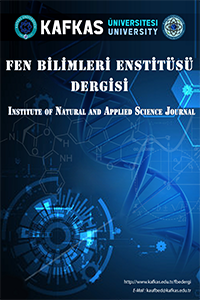Neonatal Buzağı İshalleri ve Sepsis
Neonatal Calf Diarrhea and Sepsis
___
- Akyüz, E., (2015). Deneysel endotoksemi oluşturulan buzağılarda sıvı tedavisinin hemodinamik parametreler üzerine etkisi. (Yüksek Lisans Tezi), Selçuk Üniversitesi, Sağlık Bilimleri Enstitüsü, Konya.
- Akyüz, E., Coşkun, A., Şen, İ., (2016) Deneysel endotoksemi oluşturulan buzağılarda sıvı tedavisinin hemodinamik parametreler üzerine etkisi. Eurasian J Vet Sci, 32(4): 246-254.
- Akyüz, E., Kuru, M., Kükürt, A., Erkılıç, E.E., Uzlu, E., Kırmızıgül, A.H., Gökçe, G., Karapehlivan, M,. (2017). The determination of oxidative stress index of enteritis caused by Escherichia coli K99 strain in Simmental new-born calves. I. International Turkish Veterinary Internal Medicine Congress, 10-13 Ekim, Antalya, 176-177. Angus, D., Wax, R., (2001). Epidemiology of sepsis: An update, Crit Care Med, 29(7 Suppl), S109-116.
- Basoglu A., Sen I., Sevinc M., (2004). Simsek A. Serum concentrations of tumor necrosis factor-alpha in neonatal calves with presumed septicemia. J Vet Intern Med, 18(2):238-241.
- Başoğlu A., Aydoğdu U., (2013). Terminal atrial standstill with ventricular escape rhythm in a neonatal calf with acute diarrhea. Turk J Vet Anim Sci, 37: 362-365.
- Baykal, Y., Erikçi, S., Azal Ö., Karaayvaz M., Zeybek N., (2001). Şok ve Tedavisi, Ayın Kitabı, GATA.
- Bone R.C., Balk R.A., Cerra, F.B., Dellinder R.P., Fein A.M., Knaus W.A., Schein R.M.H., Sibbald W.J., (1992). Definitions for sepsis and organa failure and guidelines fort he use of innovative therapies in sepsis, Chest, 101,1644-1655. Bone R.C., Charles J.F., Clemmer T.P., Slotman G.J., Metz C.A., Balk R.A., (1989). Sepsis sydrome:A valid clinical entity, Critical Care Medicine, 17(5), 389-393.
- Boersema S.J., Silva J.C., Mee J., (2010). Noordhuzien J. Infectious calf diarrhoea and septicemia in Farm health and productivity management of dairy young stock. Netherland Wageningen Academic Publishers.
- Cihan, M., (2013). Neonatal buzağılarda resusitasyon ve kritik bakım. Turkiye Klinikleri J Vet Sci, 4(1): 13-17.
- Constable P.D., (2000). Clinical assessment of acidbasestatus: comparison of the Henderso Hasselbalch and strongion approaches. Vet Clin Pathol, 29(4):115-128.
- Constable P.D., (2007). General Medicine, Veterinary Medicine Ed Radostits OM, 10th ed. Salinders, USA, 51-58.
- Gerros T.C., Semrad S.D., Proctor R.A., (1995). Alterations in clinical, hematological and metabollic variables in bovine nenatal endotoxemia, Can J Vet Res, 59,34-39. Klein D., Kern A., Lapan G., Benetka V., Möstl K., Hassl A., Baumgartner W., (2009). Evaluation of rapid assays for the detection of bovine coronavirus, rotavirus A and Cryptosporidium parvum in faecal samples of calves. Vet J, 182, 484-486.
- Kocabatmaz M., Aslan V., Sezen Y., (1998). Nizamlioğlu M. İshalli neonatal buzağıların prognozu ve tedavisi. Selçuk Üniversitesi Vet Fak; 4(1):197-212.
- Levy M.M., Fink M.P., (2003). Marshall JC, Abraham E, Angus D, Cook D, Cohen J, Opal SM, Vincent JL, Ramsay G. 2001 SCCM/ESICM/ATS/SIS International Sepsis Definitions Conference, Crit Care Med, 31(4),1250-1256.
- Lohuis J.A.C.M., Verheijden Y.H.M., Burvenich C., Van Miert A.S.J.P.A.M., (1988). Pathophysiological effects of endotoxins in ruminants. Changes in body temparature and reticulo-rumen motility and the effect of repeated administration, The Veterinary Quarterly, 10(2),109-116.
- Lorenz I., Fagan J., More S.J., (2011a). Calf health from birth to weaning. II. Management of diarrhoea in pre-weaned calves. Irish Vet J, 64 (9), 1-6.
- Lorenz I., Mee J.F., Earley B., More S.J., (2011b). Calf health from birth to weaning. I. General aspects of disease prevention. Irish Vet J, 64 (10), 1-8.
- Mackay R.J., (1996). Endotoxemia, Large Animal İnternal Medicine, Ed: Thomson B., Mosby, Miisouri, 733,741.
- McGuirk S.M., (2008). Disease management of dairy calves and heifers. Vet Clin North Am Food Anim Pract; 24(1):139-153. Mulcahy G., Murphy T.M., (2010). Control of cryptosporidiosis in neonatal calves: use of halofuginone lactate in two different calf rearing systems. Prev Vet Med, 96(3-4):143- 151.
- Nguyen H.B., Rivers E.P., (2006) Abrahamamian, F.M., Moran, G.J., Abraham, E., Trzeciak, S., Huang, D.T., Osborn, T., Stevens, D., Talan, D.A., Severe sepsis and septic shock: Review of the literature and Emergency Department management guidelines, Annals of Emergency Medicine, 48(1), 28-54.
- Ok M., Güler L., Turgut K., Ok U., Sen I., Gündüz I.K., (2009). The studies on the aetiology of diarrhoea in neonatal calves and determination of virulence gene markers of Escherichia coli strains by multiplex PCR. Zoonoses Public Health; 56(2):94-101.
- Smith W.G., (2009). Treatment of calf diarrhea: oral fluid therapy. Vet Clin North Am Food Anim Pract; 25(1):55-72.
- Şahin, T., Karadağoğlu, Ö., (2015). Neonatal dönemde görülen buzağı ishallerinde klinik besleme. Turkiye Klinikleri J Anim Nutr&Nutr Dis-Special Topics, 1(3):67-74.
- Trefz F.M., Lorch A., Feist M., Sauter-Louis C., Lorenz I., (2013). The prevalence and clinical relevance of hyperkalaemia in calves with neonatal diarrhoea. Vet J, 195(3): 350-356.
- ISSN: 2587-2389
- Yayın Aralığı: Yılda 2 Sayı
- Başlangıç: 2008
- Yayıncı: Kafkas Üniversitesi
Bazı Kirleticilerin Teleostların Ovaryumları Üzerindeki Histolojik Etkileri
Özlem ÖNEN, Pınar AKSU KILIÇLE, Sema İŞİSAĞ ÜÇÜNCÜ
Some Effects of Toxins on Mammalia
Özlem Önen, Pınar AKSU KILIÇLE
Mustafa GÜRSOY, Zeyni ARSOY, Murat SERT
Neonatal Buzağı İshalleri ve Sepsis
Enes AKYÜZ, Amir NASERİ, Ekin Emre ERKILIÇ, Mustafa MAKAV, Erdoğan UZLU, Ali Haydar KIRMIZIGÜL, Gürbüz GÖKCE
Kanatlı Beslemede Doğal Bir Yem Katkı Kaynağı: Resveratrol
Mükremin Ölmez, Mustafa MAKAV, Hüseyin Avni Eroğlu, Tarkan Şahin
Bitki Biyoteknolojisinde Genetik Kaynakların Önemi
Kars İli Kağızman İlçesi Atmosferik Polen ve Mantar Sporlarının Belirlenmesi
Şahin YALÇİN, Mustafa Kemal ALTUNOĞLU, Salih AKPINAR, Gül Esma AKDOĞAN
Kars İli 2013 Yılı Bal ve Polen Granüllerinin Analizi
Mizgin SÜLÜN, Mustafa Kemal ALTUNOĞLU, Gül Esma AKDOĞAN, Salih AKPINAR
